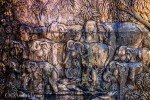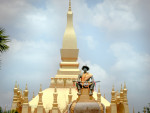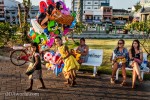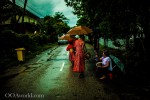A short article about Eastern philosophy (or Asian philosophy) and some of the challenges linked to education and poverty when asking people “What’s your philosophy of life?”, based on discussions with interviewees in Laos. Also read an earlier piece on the challenges of communicating and carrying out video interviews in a foreign language.
Sister Marie-Catherine, 83 years old. I meet her at the airport on our way to Luang Prabang. She works at an orphanage there, which specializes in the education of deaf and mute children. Most of them come from very poor families, one might say destitute. The handicap of the children generally only adds to the distress of their parents.
Who knows what might become of these families and children were it not for Marie-Catherine and her orphanage. There she volunteers with others to educate kids who would otherwise be lost, giving them a primary school and providing professional training.
Her age and venerable, dignified demeanor deliver an immediate sense of security.
She’s accompanied by two French volunteers who evidently look up to her with great admiration.
I try to interview her, asking: “What’s your philosophy of life?” She calmly, reservedly declines. Maybe I sounded too eager.
—
I tell her more about the project, and we have an interesting discussion about it. She points out some of the cultural differences between the ‘West’ and Asia. According to her, Asian culture as a whole means that individuals are less apt to express themselves individually.
Marie-Catherine also alludes to the general level of education: many (most?) people are not always as cultivated – they don’t have the means or the formal education – to give an intellectual answer as such.
Often times they are more down to Earth. Life is more simple and less regimented.
Marie-Catherine smiles. Often times the people here are also more hospitable, and the sense of belonging to a community is quintessential, whereas it has almost all but disappeared in the West. She remembers traveling to Europe when she was younger, and being appalled that her hostess presented a whole roast chicken, which was then carved and cut into three separate plates.
“Here everybody shares the same bowl of soup,” she says, with a benign smile.
—
When I told another Laotian native about asking people here about their philosophy of life, his answer was to the point:
“They don’t have the same education, money is their only philosophy.”
To a certain extent, these points of view agree with my experience. Without the help of a translator or local guide to introduce us to people and help with communication, it has been very difficult to successfully ask people of all casts and social classes, a concept which remains at the very foundation of this project.
Many times I am limited to ask English-speaking people in urban areas. The people who understand the question and are willing to answer tend to be younger and relatively well-educated. Sometimes they’re small business owners, or people in the service industry who are used to seeing and / or talking to foreigners.
The very idea of asking people about their life philosophy is, in itself, a luxury many people can’t afford, whether materially or intellectually (this being said with humble respect).
I suppose I suspected these challenges beforehand. On some level, it may be one of the reasons why I’ve also begun to ask people an even more open-ended question, to “tell me a story,” because those terms are more easily understood. Everybody has a story to share – not everybody understands the notion of having a philosophy, or even if they do, is able to put it into words.
Many times I am met with silence, or incomprehension.
However these answers, or rather non-answers, still carry meaning. They are representative of a state of mind, and perhaps even more so, a general level of education and material well-being. These are the people of the world, and their silence needs to be heard too.







1 Response
[…] I try to interview her, asking: “What’s your philosophy of life?” She calmly, reservedly declines. Maybe I sounded too eager. (Read more about her thoughts on the project and Eastern Philosophy vs Western Philosophy.) […]